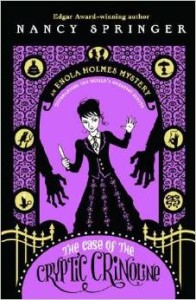 In her fifth book, The Case of the Cryptic Crinoline, Enola meets Florence Nightingale and rescues her landlady who is sweet, deaf, and more observant than Enola bargained for. We learn a bit more about the horrors of war, the plight of the poor, and the devastation that can occur when those overlap. Sherlock is still evolving, gaining more and more respect for his little sister and being won over to the idea that finishing school may not be the best place for her.
In her fifth book, The Case of the Cryptic Crinoline, Enola meets Florence Nightingale and rescues her landlady who is sweet, deaf, and more observant than Enola bargained for. We learn a bit more about the horrors of war, the plight of the poor, and the devastation that can occur when those overlap. Sherlock is still evolving, gaining more and more respect for his little sister and being won over to the idea that finishing school may not be the best place for her.
While it’s perhaps not strictly necessary to read the novels in order (the series starts with The Case of the Missing Marquess), it certainly helps to see the metaplot that goes throughout the series. I’m glad to be reading them in order, and to be reading them one right after the other as there are things that carry through from book to book.
SPOILER ALERT: Things you might want to know before suggesting this to your kid
Sex and Sexism
We get to meet Florence Nightingale in this book! She’s an invalid, choosing to withdraw from society rather than deal with its restrictions. She finds she can do more good when she can ignore society’s expectations. In this novel, she served as a spy during the Crimean War in addition to being a famous nurse.
The flashback to the war has all kinds of horrible sexist things. Women—including nurses and wives—weren’t allowed to spend the night with the patients, meaning that frequently the patients didn’t get the care they needed and died before morning. Women and their children accompanied their husbands to war, knowing that paychecks wouldn’t make it home in any useful and timely way—they could either go to war and hopefully eat, or stay at home and starve. Women who were widowed frequently became “camp followers” which were clearly (though not explicitly described) prostitutes, selling what they had to get what they needed to live. Mrs. Tupper thinks that part of why she might have been chosen to be rescued is that she never did do that, no matter how bad things got. She explicitly states that she doesn’t judge anyone who did, though.
Florence Nightingale tells Sherlock that finishing school, with its required corsets, would have possibly been a death sentence to Enola. Corsets are devices of torture.
Women’s skills continue to be the best way to hide things from at least half the population—a secret message is embroidered onto a crinoline, and not a single man suspects, even those who look right at it.
Death
The opening scene—a flashback to a hospital in Scutari, Turkey during the war—is pretty rough. It even comes with a warning to the gentle reader that they may wish to skip ahead to the first chapter. Mrs. Tupper’s husband is dying, but as night falls, she has to leave him. Later we get more of the story, about how he died and she was stranded and starving, far from home. She was pregnant when her husband died, and the baby was stillborn. We learn that she went deaf from the shelling, so she’s been deaf long before she was old.
Kidnapping
Looking for a message that was never received, two men break into Mrs. Tupper’s house and rummage through everything. When they can’t find the message, they kidnap her with the expectation of getting information from her. Everyone is very scared for what might happen to her at the hands of these hooligans (everything turns out ok in the end).
Classism
Enola still seems a bit dense, especially when it comes to those who are lower class than she is. She would do better if she were a bit more passively observant, rather than trying to force her own point of view onto every bit of information that comes her way. She expects (and in fact gets) better behavior from a man by appealing to his noble heritage.
Stereotypes
The Irish are gossips and heavy drinkers. This is more or less accepted as fact.
Loyalty
Enola will not abandon Mrs. Tupper, who has been more motherly to her than her own mother ever was. Enola learns that many of the people closest to her are well aware that she’s not what she seems, and they have plenty of theories about what she’s hiding. Enola learns that she’s not quite as clever as she assumes, these people aren’t as stupid as she assumes, and they’re more loyal and trustworthy than she imagined.
Recommendation
If you can, definitely read these in order, and do read them. The series doesn’t get particularly darker as it goes along, so anyone who enjoyed the first will likely enjoy the rest.
The Case of the Cryptic Crinoline by Nancy Springer
Published in 2009 by Philomel Books
Fifth in a series, after The Case of the Missing Marquess, The Case of the Left-Handed Lady, The Case of the Bizarre Bouquets and The Case of the Peculiar Pink Fan
Borrowed from my daughter’s middle school library thanks to their wonderful summer borrowing program





Speak Your Mind